- Home
- Blog
- Internet Of Things
- Top 10 Real World IoT Applications

- Big Data in IoT
- Big Data vs IoT
- IoT Architecture
- IoT Career
- IoT Devices
- IoT Examples
- IoT Hardware and Software
- IoT Interview Questions and Answers
- IoT Tutorial - What is IoT?
- Top 10 Reasons Why You Should Learn IoT
- Technology and Protocols of IoT
- Internet of Things Devices
- What is IoT? - A Complete Guide
- Real Time Applications of Internet of Things
- What is ICMP?
- loT Solutions Architect
Internet of Things, popularly known as IoT, is a technical concept that allows various digital and mechanical computing devices, humans with unique identifiers, objects, and even animals to stay connected over a general platform in order to communicate and transfer data without any interactions between humans or computers but with an IP (Internet Protocol) address.
This advanced technology is widely used by all big organizations to share data both inside and outside of the premises.
IoT has its own set of applications that helps a firm to grow in terms of its service, production, connections, and communications. This article will deal with IoT applications to elucidate the importance of IoT usage.
If you want to enrich your career and become a professional in IoT, then visit Mindmajix - a global online training platform: "IoT Training" This course will help you to achieve excellence in this domain.
10 Best Examples of IoT Based Applications - Table of Content
1. Healthcare
3. Smart Homes
4. Smart City
5. Agriculture
9. Smart Grid
10. Wearables
Need for IoT:
IoT is widely used in almost all of the big organizations and MNCs due to its benefits which helps them to improve their standard of communication and work by offering them a platform to share data across the globe without any restrictions.
Data is the reflection of a business or a company’s performance and by sharing data with all of its stakeholders, the true picture of a firm is brought to light, leading to further updates and corrections.
-
IoT brings in transparent customer-relations.
-
IoT’s ‘track and monitor’ feature helps one to control the organization’s happenings from one place.
-
Sharing data/insights lead to better decision making.
-
It provides the real picture of one’s systems and their usage.
-
The automation feature reduces work pressure and the money spent on laborers.
-
A company’s service can be improved without spending much money.
-
IoT has become the base for today’s lifestyle.
[Related Article: Learn Latest IoT Career]
Principals Followed by IoT Application Developers:
The applications of IoT are designed and crafted by IoT professionals who focus on including various features and factors like network connectivity, sensors, interactive devices, actuators, data analyzing elements, and a platform that connects the users and the application for interactions,
just to make sure that IoT becomes applicable for both industrial products and business services. This is also called M2M (Machine-to-Machine) App Development.
Here are the basic Principles, an IoT Application Developer must keep in mind:
-
Design an application that is apt for effective data management.
-
Develop the security for the applications, just to make sure that the data is collected safely and sound.
-
Sharing and communicating data should be very effective and should be organized too.
-
The usage of the cloud and its link with IoT applications is vital.
-
A platform for IoT is a mandatory step that a developer needs to develop.
Top 10 Real-Time IoT Applications
1. Healthcare:
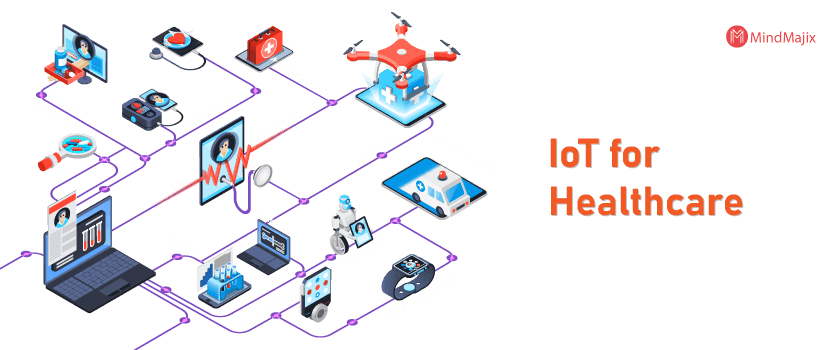
IoT deals with healthcare through its connection mechanisms. Devices like smartwatches or fitness bands or stress detectors are a great example of IoT applications that involve the welfare of the public.
Other smart medical devices used in companies lead to a better healthcare system too. An individual’s health and the ways to improve it are all known to them via these healthcare devices. The base for this application is IoT’s ability to connect devices, collect data through sensors, and analyze them to form the right results.
2. Industrial Use:
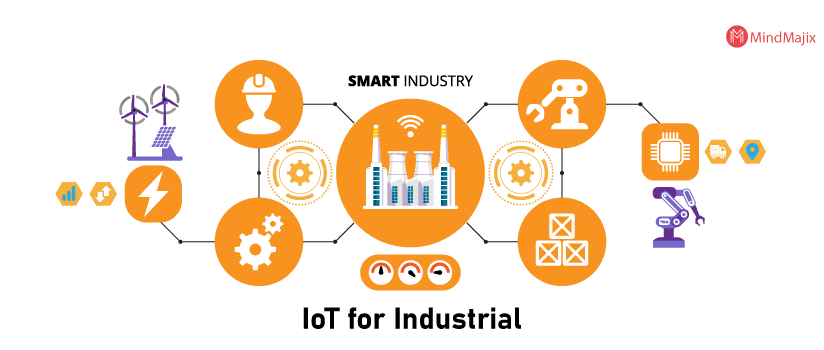
As the name suggests, this application deals mostly with the industrial sector than the personal sector. IoT applications deal with developing the industry and it's working methods with the help of software used for data analysis, sensors, tracking devices, and machines that are effective and masterly.
These help a firm to have accurate, enhanced, and transparent functioning. One can not only improve things but can also identify the damaged spots for an accurate cure. When IoT is used in industries, a sustainable approach is well-established.
3. Smart Homes:
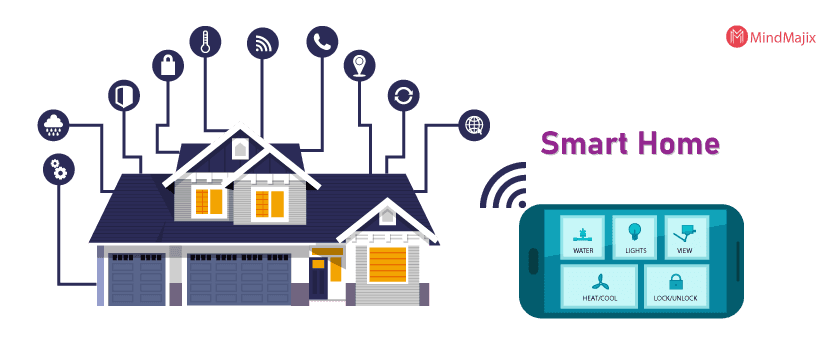
When the homes are at their best when their lives will be the best too.
However, in order to make your homes smart, the application of IoT is necessary as it helps the owner to control and supervise their lights, security, fans, water supply, and other home devices through any of their smart devices.
In short, a smart home is a modern-technological experience that will help the owners save their money, time, and energy spent on their daily-life.
4. Smart City:
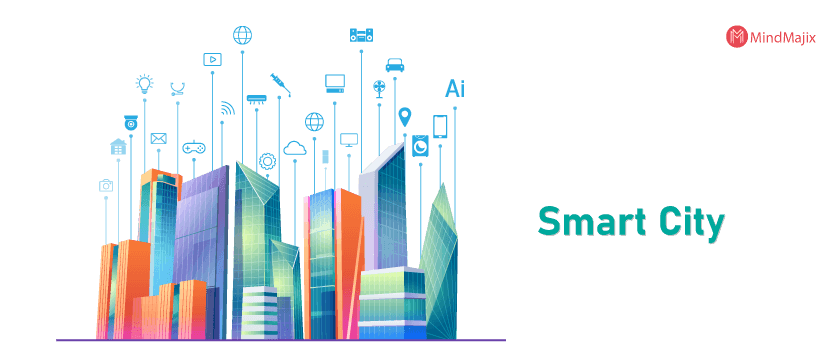
When the homes in the city become smart, so does the city which gets to have many infrastructural developments due to IoT applications. IoT also has its way around in the transport sector, government services sector, traffic management sector, health care, agricultural sector, water and energy sectors, and also in the waste management sector, which leads to a sustainable way of living by removing the difficulties of the living population.
Cities are also protected and observed for security and development through IoT.
5. Agriculture:
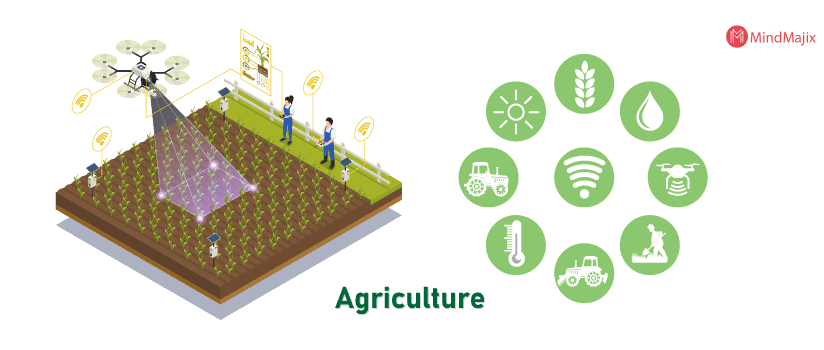
Agriculture is always the need-in-hour service and with the due increase in population, its demand rises too. However, in order to meet the current and future farming needs, farmers should use smart methods and techniques.
IoT offers many such smart techniques like its automation feature helps the farmers to fertilize their plants at regular intervals, keep a check on the usage of water, be aware of the right time to harvest. analyze the soil’s texture, nutrients, and also its ability to yield.
Livestock can also be monitored through IoT’s sensor tools. In order to predict the weather before/during/after a yield, one can use AIIMETOE / Pynco, the 2 best IoT farming devices.
Visit here to learn IoT Training Hyderabad
6. Smart Supply Chain:
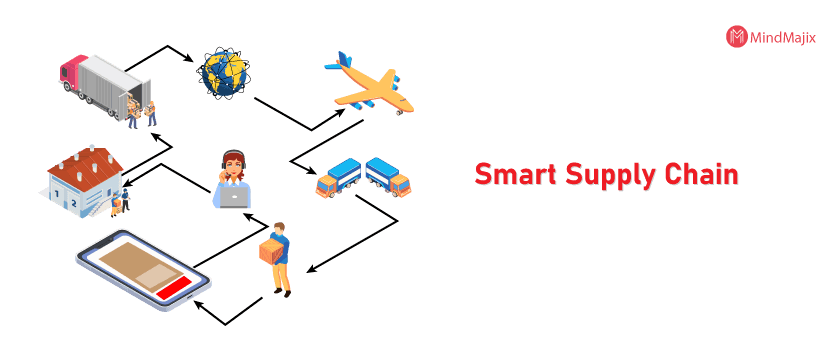
A supply chain deals with the process involved in delivering a product or service to a consumer. When the traditional methods are used, this supply chain charges more manpower and thus more money, energy, and time.
However, when IoT is applied here, then through its tracking systems (GPS / Radio Frequency) and sensors, one can easily, without much pressure and money involved, can track their goods, the shipment process, and also the transportation operations.
IoT sensors can be used to know the effectiveness of each machine and its work settings can also be changed, if necessary. With less manpower, but more work is done, the company’s work is optimized at all levels.
[Related Article: What is AWS IoT - Complete Guide]
7. Retail Purpose:
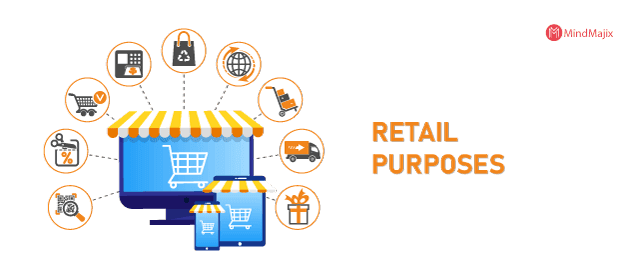
Retailing is all about connecting with the consumers on a more personal level and IoT enables a retailer to stay connected with their consumers with the help of their smartphones.
Through this connection, the retailers get real feedback from their consumers and also helps them find the demand in their particular place in order to change their goods supply accordingly.
On the whole, the overall in-store experience is enhanced to meet the needs of their prospective customers, goods are advertised effectively, and the supply chains are well maintained. Even payment procedures are enhanced.
8. Transportation:
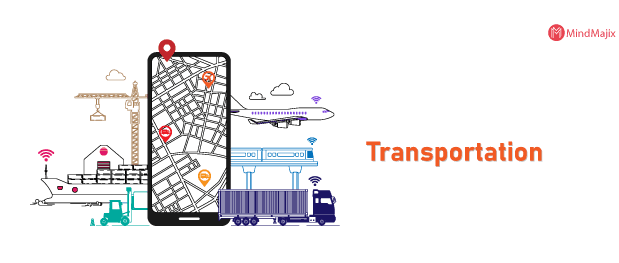
Smart cars are a great example of how IoT is used for controlling, monitoring, and driving a car with the help of a smartphone / any other smart device through integrated sensors and a central computer installed in the car.
Manufactures also use such sensors to know about their supply-chain and hence attach a sensor in the vehicle that transports their goods. Even taxis work based on this IoT application, in order to pick-up / drop their customers from and in their desired destinations, respectively. One can also get these sensors to usage while trying to park their smart car in their garage.
9. Smart Grid:
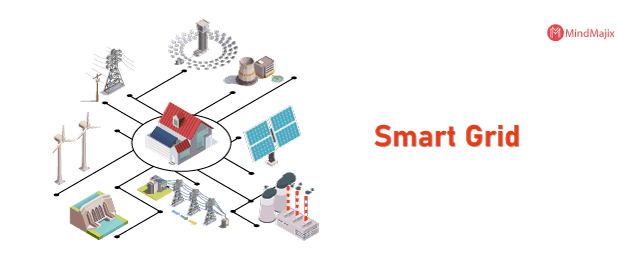
These grids of IoT are also known as Power / Intelligent grids as they brilliantly manage the power resources by keeping a regular/automated check on the supply and demand of energy/electricity.
It’s transmission, consumption, distribution, and generation are all identified and monitored. This leads to an increase in the economics and efficiency of electricity/energy. The Solar Panel is one of the best examples of a smart grid.
10. Wearables:
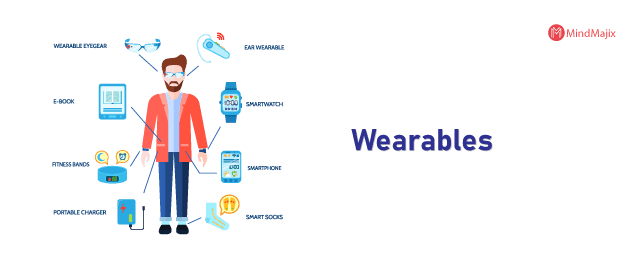
Wearables refer to the smartwatches produced by Apple, Motorola, and others, Myo Gesture Control, the LookSee bracelet, and many more which work with a sensor and software. They are used by the users to know about themselves for development and enhancement.
Wearables can be used by users for fitness, entertainment, GPS, and also other health purposes. However, the energy/power released or used by IoT in these wearables are very less and thus they do not affect the users.
[Related Article: IoT Interview questions for professionals]
Advantages of IoT Applications
1. Security: You can monitor your home through your mobile phones, with the ability to control it. They can provide personal safety.
2. Stay connected: You and your family members can always be in the network. You can virtually stay connected.
3. Efficient usage of electricity and energy: If your home appliances are communicating with you about the work done, their maintenance and repair, and can operate by themselves, electricity is utilized in an efficient way. You need not worry about cooking so that you can concentrate on other things.
4. Your Pocket Personal Assistance: IoT Applications can provide personal assistance who can alarm on your everyday plans.
5. Road Safety: GM OnStar is an embedded system in cars that can detect a car crash or accidents on roads. If a crash or accident has occurred and it automatically calls 9-1-1.
6. Better Health Care and Management: The patient monitoring can be done on a real-time basis without a doctor's visit and enables them to make decisions as well as offer treatment that is evidence-based.
7. Cost-Efficient Business Operations: Many business operations like asset tracking and inventory control, shipping and location, security, individual order tracking, customer management, personalized marketing & sales operations, etc. can be done efficiently with a proper tracking system in a business.
Disadvantages of IoT Applications
1. Privacy issues: There is always the possibility of hackers breaking into the system and stealing the data. And one might want some personal space in life. So staying connected with family and friends always giving them every detail of our life activity is not good. There is every possibility of misusing your information.
2. Supper-reliance on technology and electronic gadgets: The younger generation has grown up with readily available things. The internet and technology making them so non-brainy. A simple maths calculation of adding and subtracting is done through a calculator readily available on our phones. The more we entrust and dependent on the Internet, there are more chances of a potentially grievous event if we lose it.
3. Becoming Indolent: People are more habituated to have click-based work making them lazy to any sort of physical activity, applied science in their daily routine.
4. Unemployment: People at lower levels like unskilled labor may have high risks of losing their jobs. Security Guards, House Servants, Iron & Dry wash services, etc may not have proper employment opportunities as the IoT devices replace their work, and people can work on their own.
[Related Article: IoT Tutorial for Beginners]
Future of IoT
IoT is the new trendsetter in today’s world due to its amazing and advanced applications which makes life easier for both individuals and entrepreneurs. With such demand, the scope of IoT in the upcoming days will also be more as there will be more smart homes, retails, and cities.
Each application of IoT will be in great use and the demand will be more as well. IoT along with AI will also be advanced as new scopes, markets, and applications like 5G networks, will be edged too and all of this will lead to a better economy and a fast-evolving lifestyle.
Therefore, by 2025, there’ll be more than 30 million users for IoT applications and the numbers will only go up as IoT will become a major part and indispensable of our lives.
Conclusion
Internet of Things / IoT is a platform that connects the virtual world to real-time life by means of RFID, sensors, Artificial Intelligence, connectivity, and communicating devices. All this helps a person better their lives and also aids a firm to uplift their business practices. However, the need for IoT will only increase over the years as men and women want a life that’s better than the one they had a day before and IoT will only improve one’s lifestyle. It will also contribute to a better economy of the state and the firms. Therefore, IoT is not just a mere invention to communicate without human interference but is a means of life itself.
 On-Job Support Service
On-Job Support Service
Online Work Support for your on-job roles.

Our work-support plans provide precise options as per your project tasks. Whether you are a newbie or an experienced professional seeking assistance in completing project tasks, we are here with the following plans to meet your custom needs:
- Pay Per Hour
- Pay Per Week
- Monthly
| Name | Dates | |
|---|---|---|
| IoT Training | Feb 24 to Mar 11 | View Details |
| IoT Training | Feb 28 to Mar 15 | View Details |
| IoT Training | Mar 03 to Mar 18 | View Details |
| IoT Training | Mar 07 to Mar 22 | View Details |

Ravindra Savaram is a Technical Lead at Mindmajix.com. His passion lies in writing articles on the most popular IT platforms including Machine learning, DevOps, Data Science, Artificial Intelligence, RPA, Deep Learning, and so on. You can stay up to date on all these technologies by following him on LinkedIn and Twitter.



